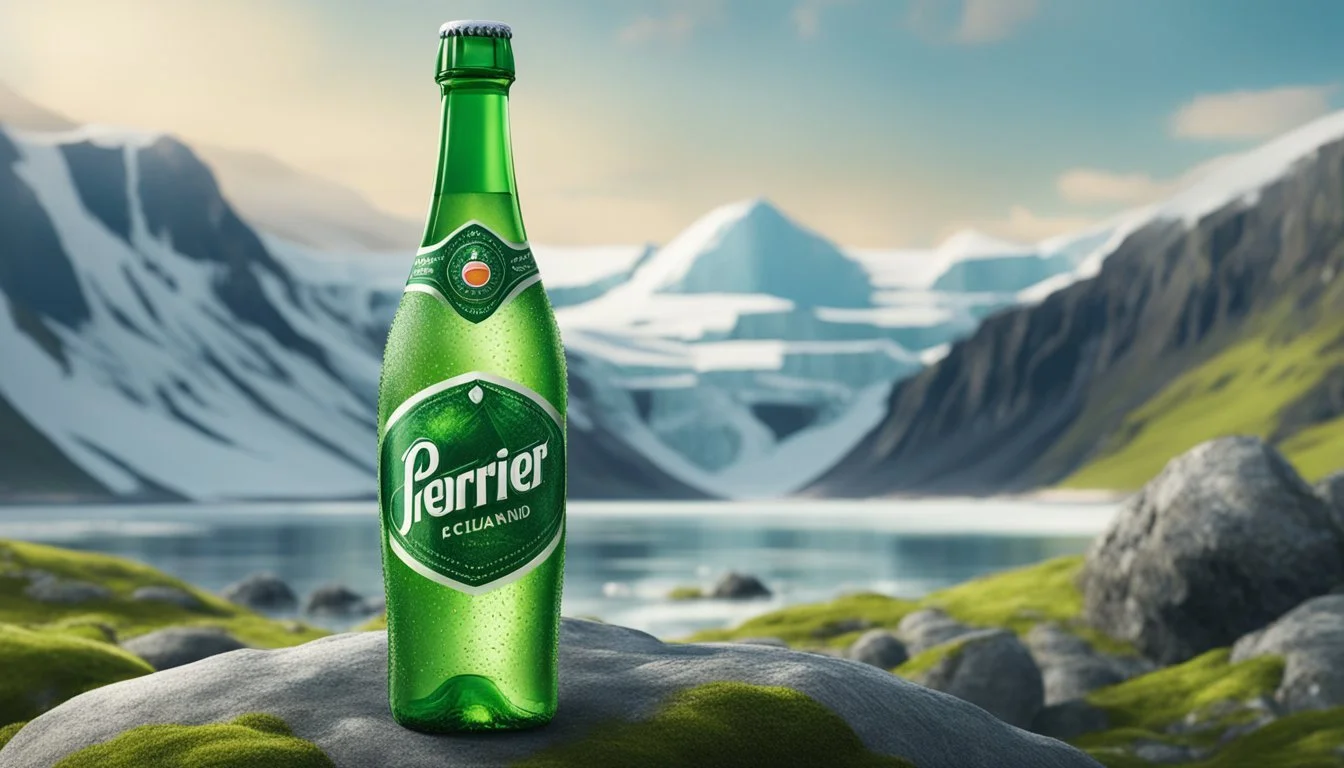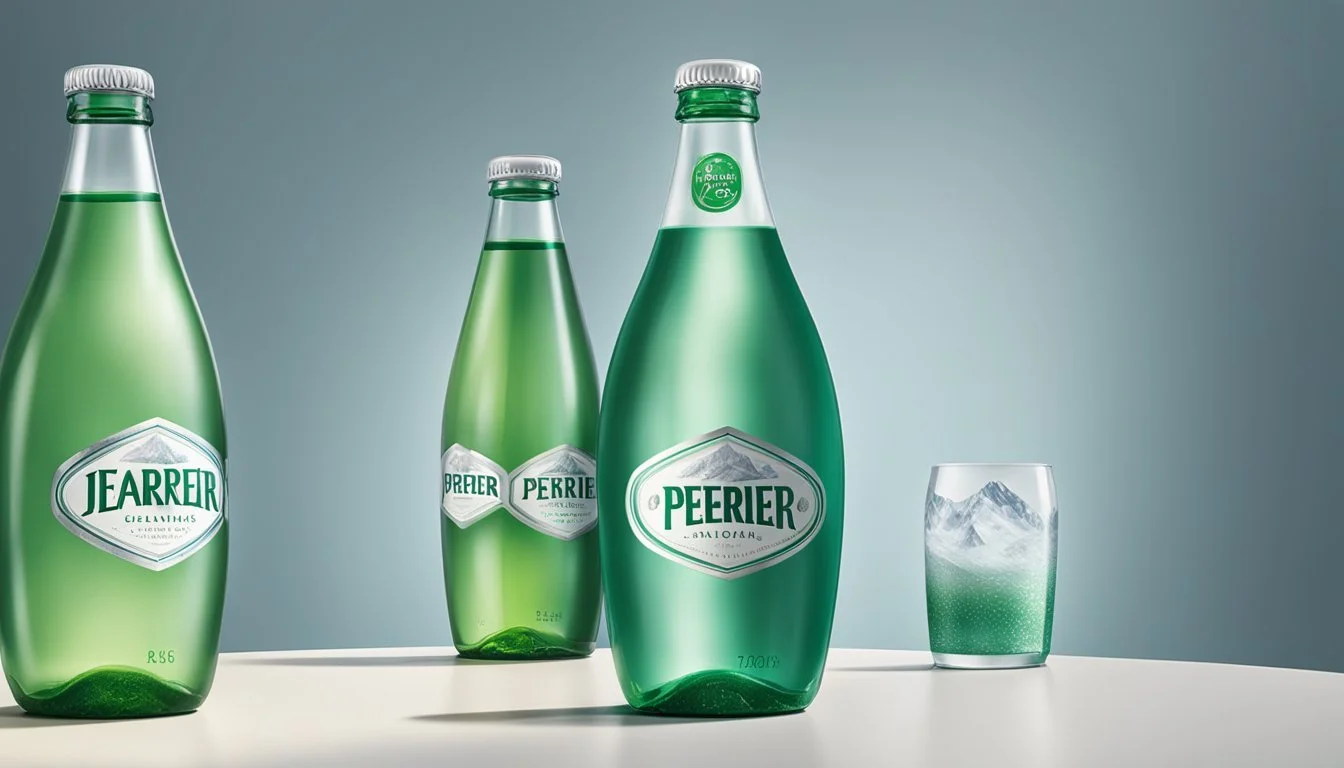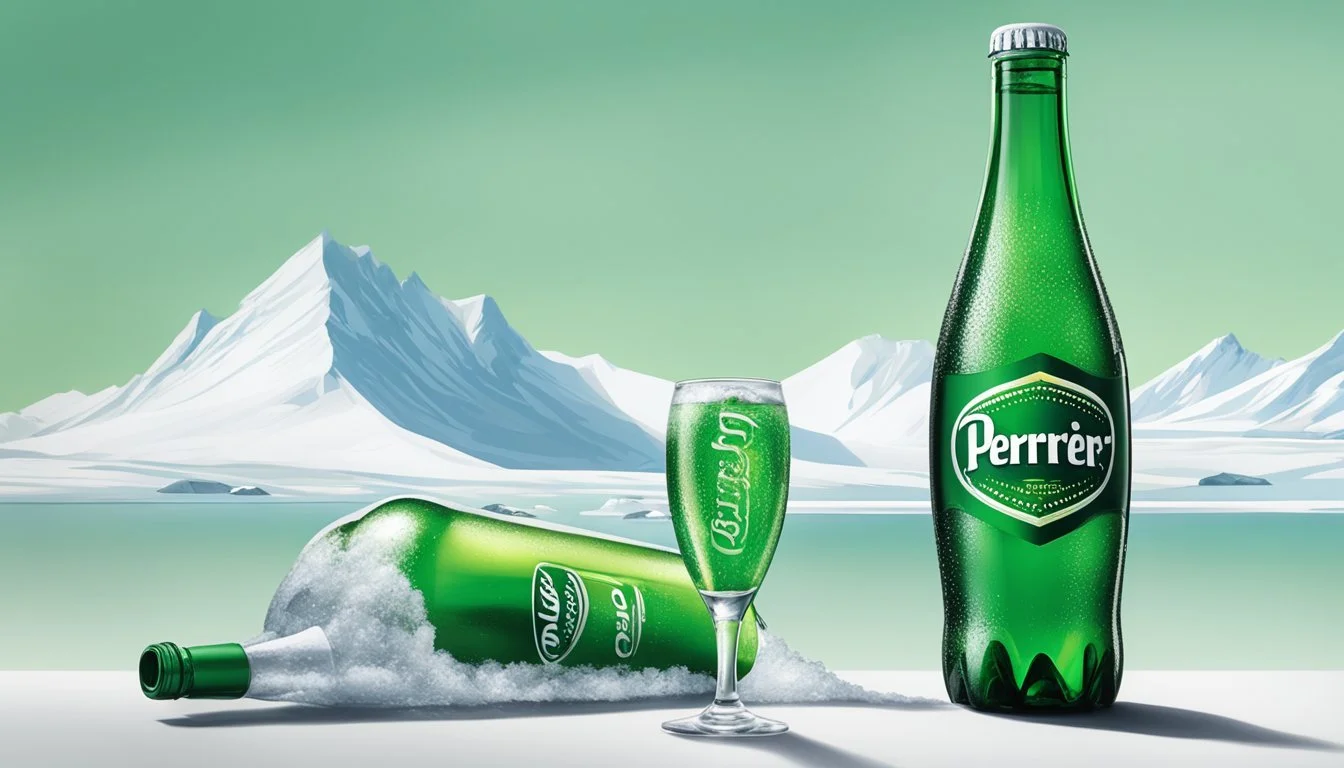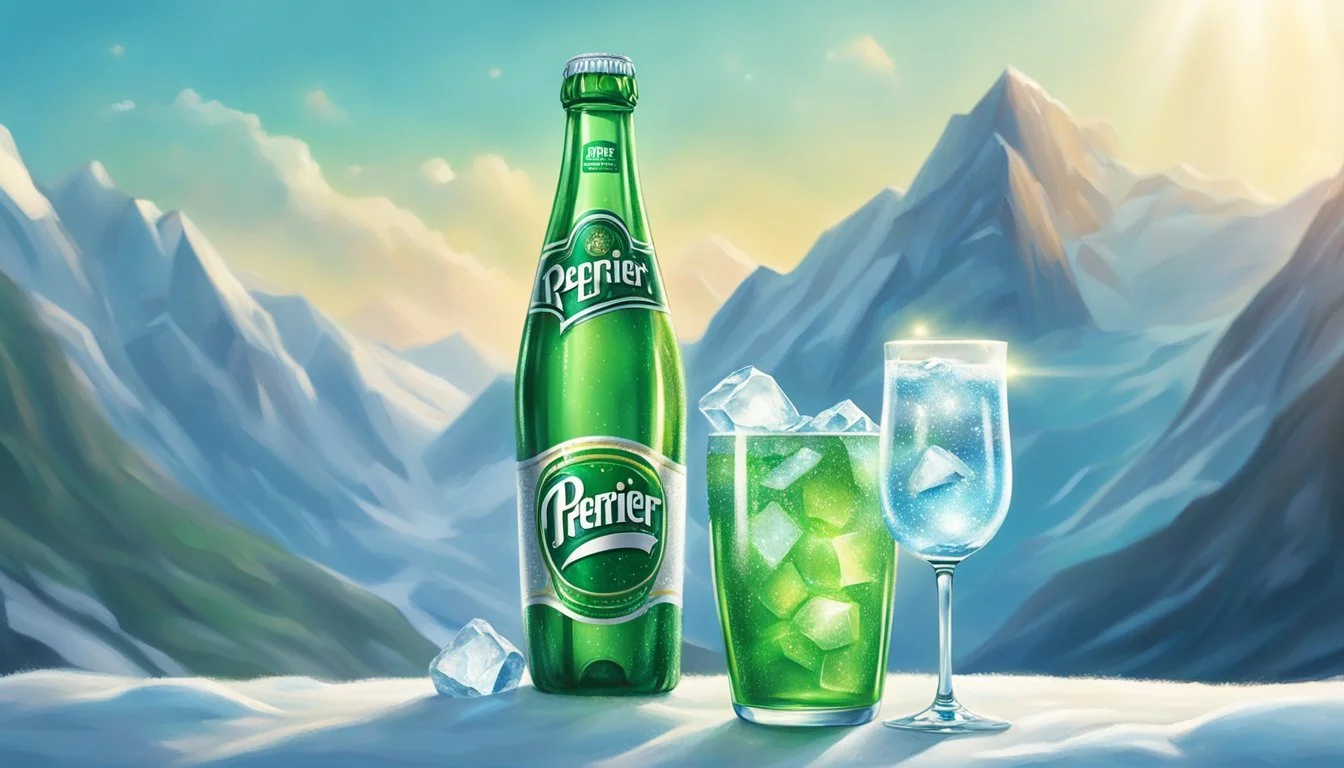Icelandic Glacial vs. Perrier
Comparing Quality and Taste of Premium Waters
Selecting the right bottled water can be more than a matter of taste—it’s also about the purity of the source and the process behind the bottling. Icelandic Glacial water, touting itself as the cleanest in the world, comes from the legendary Olfus Spring in Iceland, a source reputed for its pristine and untouched quality. With a commitment to sustainability, Icelandic Glacial impresses not just with its water but with its environmentally friendly practices as well.
Perrier, on the other hand, has a longstanding history in the industry, originating in France and recognized for its natural carbonation and distinctive green bottle. Perrier's source has been managed since the time of Napoleon III, and the brand has long been associated with sophistication and refreshment, particularly in its sparkling water variety. Unlike Icelandic Glacial, Perrier offers a unique minerality and effervescence derived from its volcanic source.
In the conversation of Icelandic Glacial versus Perrier, consumers weigh factors like taste, purity, environmental impact, and brand heritage. While Icelandic Glacial boasts a pure and clean taste with a strong environmental ethos, Perrier brings a bubbly zest and time-honored legacy. Each brand stands distinct in what they offer to aficionados of bottled water, indicating that the choice may transcend mere hydration to reflect personal values and preferences.
Overview of Icelandic Glacial and Perrier
In the world of bottled water, Icelandic Glacial and Perrier represent two distinct brands known for their unique sources and rich heritages. As consumers navigate the numerous options available, understanding the origins and processes behind these waters can guide informed choices.
Brand Heritage
Icelandic Glacial boasts a legacy tied to its origin from the pure, untouched Ölfus Spring in Iceland. Sourced from a sustainable aquifer, it is filtered naturally through layers of volcanic rock, imparting a clean, crisp taste without human interference. Icelandic Water Holdings hf. is the steward of the brand, maintaining its operations based in Hlidarendi, Ölfus, ensuring the protection and longevity of this natural resource.
Perrier, on the other hand, has built its reputation over the years as a classic French brand. Deriving its name from the renowned Les Bouillens spring in the town of Vergèze, situated in the south of France, Perrier is a sparkling mineral water loved for its naturally occurring carbonation and distinctive green bottle. As a product that has punctuated fine dining experiences for generations, Perrier's tradition is steeped in the luxury and allure of the French lifestyle.
Source and Acquisition
The source of Icelandic Glacial water is the majestic Ölfus Spring, a renewable resource fed by rainfall and snowmelt from surrounding mountains. This spring provides water so pristine it requires minimal treatment before bottling. The unique geological layers of Iceland act as a natural filtration system, creating bottled water that is naturally alkaline.
Perrier's effervescent mineral water emerges from a source deep within the French Alps, known to have been used by people since Roman times. The water is naturally carbonated by volcanic gases that accumulate in the groundwater, giving Perrier its signature bubbles. The collection and bottling process is carried out with care to preserve its mineral content and inherent bubbly character.
Chemical Composition and Health Benefits
The comparative analysis of the chemical composition of Icelandic Glacial and Perrier waters reveals their distinct mineral profiles and subsequent health benefits. These waters are esteemed for their naturally occurring electrolytes and minerals, which can significantly impact hydration and metabolic functions.
Mineral Content Analysis
Icelandic Glacial water is sourced from the Ölfus Spring in Iceland and boasts a low total dissolved solids (TDS) level, notable for its pristine quality. Its mineral profile is marked by a high silica content, which supports skin, hair, and nail health. The water also contains beneficial minerals such as calcium and magnesium, essential for bone strength and muscle function.
Perrier, a sparkling mineral water sourced from the South of France, exhibits a different mineral composition. Its higher level of TDS is reflective of its ample mineral content, including elements such as calcium, magnesium, and potassium. Despite being carbonated, Perrier has less than 6.0 pH due to its acidity, but still contains a range of minerals beneficial to health.
Health Impacts of Electrolytes and Minerals
Electrolytes such as sodium, potassium, and magnesium are critical for maintaining proper hydration and supporting nerve and muscle functions. Icelandic Glacial and Perrier both contain these vital electrolytes, although in varying quantities.
Minerals in water like magnesium contribute to electrolyte balance and metabolic processes, while calcium is indispensable for bone density and cardiac function. The calcium content in Perrier can contribute to these aspects of health. Additionally, the silica content of Icelandic Glacial may help in promoting joint health and preventing the degradation of connective tissues.
Both waters offer health benefits through their unique mineral content, making them more than just hydration sources. Their mineral profiles can complement a balanced diet, contributing to overall well-being.
Environmental Impact and Sustainability
When assessing Icelandic Glacial and Perrier, their approach to environmental impact and sustainability in bottling and packaging are central. Both companies endeavor to address environmental concerns, but they adopt different strategies to mitigate their footprint and promote sustainability in their operations.
Bottling and Packaging Processes
Icelandic Glacial: The company utilizes 100% recyclable packaging, including BPA-free high-grade rPET bottles and recyclable cardboard. Their bottling plant is powered by geothermal and hydroelectric power, reinforcing their commitment to reducing waste and energy use. Icelandic Glacial also offers products in glass bottles, catering to a market segment sensitive to plastic use, even when it is recyclable.
Perrier: Perrier's signature green glass bottle is widely recognized and is also 100% recyclable. They have invested in practices to limit their environmental impact during manufacturing, though they do not emphasize the use of rPET plastics as heavily as Icelandic Glacial.
Sustainability Initiatives
Icelandic Glacial: The company boasts CarbonNeutral certification for both product and operation, highlighting their efforts to offset carbon emissions. Their direct flow from natural water sources to the bottling plant without intermediaries further helps to reduce waste.
Perrier: As part of the Nestlé Waters portfolio, Perrier participates in broader corporate initiatives that aim to ensure the products meet certain sustainability and recyclable packaging targets. The brand focuses on maintaining the natural purity of its water and on being stewards of the water sources and surrounding environment.
Both Icelandic Glacial and Perrier recognize the value of prioritizing sustainability, and each has taken strides to minimize their environmental footprints, both through their bottling processes and ongoing sustainability efforts.
Taste and Palatability
When it comes to bottled water, taste and palatability often play decisive roles in customer preferences. Icelandic Glacial and Perrier both offer distinct flavor profiles that may influence an individual’s choice, while consumer taste preferences are informed by the unique characteristics of each brand’s water source.
Flavor Profiles
Icelandic Glacial Natural Spring Water is known for its smooth and crisp taste profile, a direct result of its origin from the Ölfus Spring in Iceland. The water travels through volcanic rock which naturally filters it, contributing to a clean taste with a naturally occurring alkaline pH level. Its unique taste is sometimes described as having a slight bitterness, which can be diminished when chilled.
Perrier, a French brand of natural sparkling spring water, is characterized by its notable carbonation and a refreshing, brisk taste. Originating from the Vergèze spring located in the Gard département, Perrier's flavor leans towards a sharper, more effervescent experience compared to the Icelandic Glacial, courtesy of the bubbles added during bottling.
Consumer Taste Preferences
Preferences among consumers are subjective and vary considerably. Some prefer the light, neutral taste of non-carbonated spring waters like Icelandic Glacial due to its purity and minimal processing. This brand is often favored by those who enjoy a cold, refreshing drink without the pungency carbonation introduces.
On the other hand, Perrier appeals to individuals who appreciate a water with a bit more character, often seeking out the tingling sensation and boldness that its added carbonation provides. The presence of bubbles in Perrier can be a palate cleanser or a lively drinking experience for those who may find still spring waters too flat.
Both waters have high water quality standards and derive their tastes from natural sources, catering to a diverse range of palates and hydration needs. Preferences between Icelandic Glacial and Perrier often come down to whether one enjoys the soft delicacy of still water or the vibrant burst of sparkling water.
Comparative Analysis of Pricing
When assessing the pricing of Icelandic Glacial and Perrier bottled water, consumers should consider both the direct costs and the perceived value that each brand offers.
Cost Evaluation
Icelandic Glacial is sourced from the Olfus Spring in Iceland and is known for its purity. The price for a standard 500ml bottle can vary but is generally around $1.29, which reflects its positioning as a premium brand. In contrast, Perrier, a sparkling water sourced from Vergèze, France, may have a different price point that can depend on the market and the specific product offering, whether it be plain or flavored. A 750ml bottle of Perrier typically costs around $2.00.
Price per 500ml for Icelandic Glacial: $1.29
Price per 750ml for Perrier: $2.00
Value for Money
The value proposition of a bottled water brand can be subjective and of personal preference, based on factors such as taste, carbonation, and brand image. While Icelandic Glacial offers a flat water with a reported 8.4 pH level, appealing to those seeking alkaline water, Perrier is often desired for its carbonation and mineral content. The price-to-volume ratio can be an insightful metric for consumers comparing these brands:
Price-to-volume ratio for Icelandic Glacial: $0.00258/ml
Price-to-volume ratio for Perrier: $0.00267/ml
The Return on Investment (ROI) for bottled water includes subjective elements such as satisfaction and brand devotion, which do not always correlate with the price. Consumers often decide what offers the greater ROI based on their personal value assessment rather than purely on financial metrics.
Product Varieties and Options
When evaluating Icelandic Glacial and Perrier, consumers will notice a distinction in product offerings related to carbonation and packaging options that align with their preferences and needs.
Still vs. Sparkling
Icelandic Glacial offers primarily still water, sourced from the Ölfus Spring in Iceland, renowned for its purity and taste. They focus on delivering an unaltered product that reflects the natural qualities of the spring water.
In contrast, Perrier is famed for its sparkling water, which is carbonated by natural gases found in the spring located in the south of France. This natural process gives Perrier its signature bubbles and a subtly unique mineral taste.
Bottle Sizes and Materials
Both brands provide a variety of bottle sizes, catering to individual and family use. Their products are available in small personal bottles and larger sizes suitable for sharing or home use.
Icelandic Glacial:
PET bottles: Ranging from 330 ml to 1.5 liters
Glass bottles: Not a primary offering, focusing on durable, recyclable plastic
Perrier:
Glass bottles: Offered in 330 ml and 750 ml sizes
PET bottles: Available in a wide range including 330 ml, 500 ml, and 1 liter
The material of the bottles also plays a role in consumer choice. Icelandic Glacial bottles are made of fully recyclable PET, promoting environmental responsibility. Perrier, on the other hand, offers the classic appeal of glass bottles in addition to PET bottles, allowing customers a choice based on aesthetic preference and sustainability considerations.
Global Market Presence and Availability
Icelandic Glacial and Perrier are reputable bottled water brands with significant market presence and availability on a global scale. Their reach is influenced by brand popularity and established distribution channels.
Brand Popularity
Icelandic Glacial has carved out a niche as an environmentally friendly brand, touting certification as CarbonNeutral for both its product and operation. It is renowned for its sustainability, powered by geothermal and hydroelectric power. On the other hand, Perrier is a classic brand with a storied history, recognized for its naturally carbonated mineral water that has been a favorite in the premium water market for decades.
When compared to other bottled water brands, such as Fiji Water and Evian, which boast their unique mineral profiles and sources, Icelandic Glacial and Perrier stand out for their distinct characteristics. Icelandic Glacial is known for its high pH level, indicative of its alkalinity, while Perrier appeals to those seeking effervescence in their water. Other brands like Aquafina and Dasani are also widely recognized, though they often rank lower in pH scale studies and cater to different market segments focusing on purified water rather than spring or mineral water.
Distribution Channels
Both Icelandic Glacial and Perrier have extensive distribution channels ensuring their products are readily available to consumers. Icelandic Glacial is found in a variety of sizes, from 330ml to 1.5 liters, and has penetrated international markets, including the U.S. Its availability spans from retail locations to online platforms like Amazon.
Perrier offers its sparkling mineral water in different flavors and packaging, making it a versatile choice for a broad audience. Its presence is secured not only in supermarkets and local stores but also in more upscale venues, such as fine dining restaurants and hotels, thanks to its image as a premium beverage.
Overall, when analyzing the landscape of bottled water brands like Poland Spring, San Pellegrino, Voss, and others, distribution becomes a critical determinant in a brand’s reach. While regional favorites like Crystal Geyser and Ozarka resonate with local markets, Icelandic Glacial and Perrier have established their ubiquity by engaging a global audience, making both brands widely accessible through diverse retail and online channels.
Regulations and Quality Standards
When evaluating bottled waters like Icelandic Glacial and Perrier on the basis of regulations and quality standards, it is essential to consider the certifications each brand holds, as well as their compliance with health-based chemical parameters and contaminant levels as measured by third-party testing.
Certifications and Compliance
Icelandic Glacial is known for scoring highly in regulatory compliance, with reports indicating near-perfect compliance with health-based chemical parameters. The brand's water is sourced from Iceland, which reportedly has a 99.97% compliance rate with the required health-based chemical parameters in their water supplies. This high compliance rate alludes to the strict quality controls in place for Icelandic waters.
Perrier, a brand with its origin in France, also upholds a strong compliance record and is subject to European regulations. Its source was authorized by Napoleon III, suggesting a longstanding tradition of quality and regulatory adherence.
Both brands possess certifications that attest to the quality of their water. Icelandic Glacial touts its NSF International certification and its water is naturally fluoride-free. Perrier’s certifications are in line with European standards for quality and safety.
Comparison of Testing Results
In comparing the testing results of Icelandic Glacial and Perrier, one should consider the brands' pH levels and contents of contaminants. Both waters are renowned for their purity and minimal contaminants.
Icelandic Glacial water undergoes a proprietary filtration process known as Hydro-7™, designed to optimize the pH level and reduce potential contaminants to negligible levels. Consequently, Icelandic Glacial boasts a naturally alkaline pH level, which is desirable to many for its supposed health benefits.
Perrier, on the other hand, is synonymous with its distinct carbonation and mineral content, which contributes to its unique taste profile. While testing results vary, Perrier consistently meets or exceeds standards for mineral water and maintains a stable pH level characteristic of its brand.
Assessing water quality involves criteria that include, but are not limited to, toxin and pollutant levels regulated by agencies such as the EPA and their international equivalents. Both Icelandic Glacial and Perrier demonstrate thorough testing results, reassuring consumers of their commitment to quality and safety.
Consumer Perception and Brand Reputation
In the bottled water market, consumer perception and brand reputation are significant factors that influence purchase decisions. Both Icelandic Glacial and Perrier enjoy strong brand reputations, but for different reasons—Perrier for its long history and iconic status, and Icelandic Glacial for its environmental initiatives and purity.
User Reviews and Ratings
Icelandic Glacial:
Purity and Taste: Users often note the crisp and clean taste of Icelandic Glacial, attributing it to the natural filtering process of the Icelandic springs.
Environmental Ethos: The sustainability efforts of Icelandic Glacial play well among consumers who are environmentally conscious.
Ratings: It generally receives high ratings across online retail platforms, typically within the 4 to 5-star range.
Perrier:
Distinctive Flavor: Consumers frequently mention the unique sparkling mineral taste of Perrier which sets it apart from flat bottled water options.
Brand Recognition: Perrier's long history and association with sophistication typically yield strong loyalty and high user ratings, often in the 4 to 5-star range.
Variety: The brand's variety of flavors is also a popular aspect that gets positive reviews.
Industry Awards
Icelandic Glacial:
It has been recognized for its environmental efforts, including its CarbonNeutral® certification.
The brand prides itself on sustainable practices, which has resonated well with industry recognition.
Perrier:
Perrier has garnered acclaim for its marketing and packaging, often seen as a trendsetter in the industry.
Its status as an iconic brand has been reinforced through various awards, celebrating its long-standing position in the market.
Final Verdict
When comparing Icelandic Glacial and Perrier, consumers are faced with a choice between two premium bottled waters with distinct characteristics. Each boasts unique selling points and draws from its own heritage and natural sources.
Recommendation
Icelandic Glacial is recommended for those seeking what many consider the best bottled water in terms of purity and environmental commitment. It emerges from the legendary Olfus Spring in Iceland and offers a low mineral content and a pH level that is naturally alkaline.
Perrier, on the other hand, is recommended for consumers who prefer sparkling water with a hint of mineral taste. It's a suitable choice for dining experiences, especially as a palate cleanser or a carbonated beverage alternative.
Summary of Key Points
Icelandic Glacial:
A leading choice in purity and sustainability.
Sourced from the Olfus Spring, known for its natural filtration and renewable resources.
Offers a smooth and clean taste with a naturally high pH level.
Perrier:
Famous for its naturally occurring carbonation and a variety of flavors.
It has a long-standing history, originating from the Vergèze spring in the South of France.
Ideal for those who enjoy a sharp, effervescent water that complements meals.
Each brand presents itself as a strong contender within the bottled water market, catering to different preferences and occasions. They exemplify the high standards many consumers expect from premium water brands, albeit serving separate niches within that spectrum.









